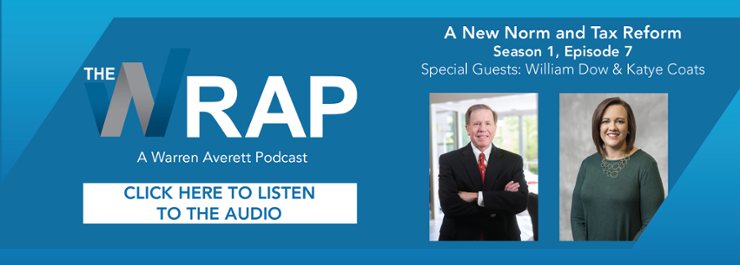10 Facts about Tax Reform All Taxpayers Should Know

The Tax Cuts and Jobs Act was the greatest change to tax law in the last 30 years, and nearly every single taxpayer (both businesses and individuals) was impacted in some way. With so many changes that have had so much impact, there’s been a lot to learn about the new tax landscape.
That’s why our team has boiled down their biggest (and their favorite) takeaways that you should know about how tax reform has affected individuals, businesses and even your favorite sports teams. Here are a few tips, tricks and fun facts to know about tax reform.
Did You Know Sports Team Trading is Impacted by Tax Reform?
According to the IRS, the trade that takes place when sports teams trade players is actually a trade of contracts, which is recorded for tax purposes as a like-kind exchange.
The Tax Cuts and Jobs Act eliminated the exemption for like-kind exchanges except for real property, like land or buildings. (This means that taxpayers can no longer postpone paying taxes on the gain of sale unless the proceeds are reinvested into similar, real property.)
Now, the trading teams must recognize a gain or loss for federal tax purposes, causing teams to pay more in taxes.
Did you know that Tax Reform brought a way to potentially defer tax on capital gains through the Opportunity Zone Program?
If you’re looking for a way to defer tax on capital gains, the Opportunity Zone program may benefit you. Congress established the program during the December 2017 tax reform legislation as a way to spur economic development by providing tax benefits for long-term private sector investments in low-income communities across the country.
If you don’t live or own property in a Qualified Opportunity Zone, that’s okay. You can still receive the tax benefit. If you have gains from the sale of stock or property, you can invest in an Opportunity Zone Fund and defer the tax on your gains until at least December 31, 2026.
You may have also heard that you can potentially have your gains permanently forgiven, and that’s true. If you invest in a Qualified Opportunity Zone Fund for five or seven years, a portion of the original deferred gain will be permanently forgiven.
Did You Know that Tax Reform Redefined What Qualifies for Bonus Depreciation?
Bonus depreciations have been around for a while, but until the Tax Cuts and Jobs Act, they had only been allowed on new assets. Previously, any used asset didn’t qualify for bonus depreciation, but now bonus depreciation can be used on new and used assets.
Not only does this help operating businesses, but it can be an added benefit to acquisitions. Historically, in a business acquisition, any assets purchased didn’t qualify for bonus depreciation. Those assets were depreciated over their useful life. Now, certain tangible depreciable assets purchased in an acquisition can be expensed immediately. This is a large incentive for businesses to invest in tangible assets.
Did You Know That Taxes Concerning Children And Dependents Changed With Tax Reform?
Included in the Tax Cuts and Jobs Act (TCJA) were several implications pertinent to parents and children.
Child tax credits doubled from $1,000 to $2,000 per child and apply to taxpayers with income up to $400,000. Kiddie tax, which applies to investment income of children under age 19 or full-time students (up to age 24) was previously dependent upon a child’s parent’s tax rate.
Since 2018, there have been separate tax rate schedules for Kiddie tax returns. This allows each child’s return to be completed without having to wait on completion of the parent’s return.
Did You Know that Your Charitable Contributions were Impacted by Tax Reform?
Charitable contributions are still deductible after tax reform, and there are three important items to consider:
- The Standard Deduction has been doubled to $24,000 for a married couple. In order to benefit from charitable contributions, your total itemized deductions will need to be greater than $24,000.
- The limitation on deduction for cash contributions to public charities is now 60% of annual gross income.
- Donations to universities in exchange for athletic seating rights (e.g., Tide Pride, Tigers Unlimited, Seminole Boosters, The Georgia Bulldog Club, etc.) are no longer deductible.
Did You Know Other Elements (Aside From The New 21% Tax Rate) Significantly Impacted Corporations and Businesses?
We’ve outlined a few of these elements here:
- 2018 and future Net Operating Losses (NOLs) have been limited to 80% of current year taxable income.
- The new law eliminates NOL carrybacks with few exceptions and allows an indefinite carryforward.
- Businesses with receipts in excess of $25 million may have a limited interest expense deduction.
- The Domestic Production Activities Deduction (DPAD) has been repealed.
- Most business entertainment expenses are no longer deductible.
- Cash basis accounting for income taxes is now available to more taxpayers.
Did You Know That A New Deduction Benefits Pass-Through Entities?
Thanks to tax reform, there’s now a new pass-through deduction that will keep up to 20% of pass-through entities’ business income from being taxed. This reduces the effective rate on pass-through income to 29.6% for high-income taxpayers.
One thing to note is that this deduction is up to 20% of income. There are many exclusions and limitations for high-income taxpayers, which is defined as over $207,500 for single and $415,000 for married filing jointly taxpayers. High-income taxpayers will likely get less than a 20% deduction due to the limitations.
In addition, high-income taxpayers in a service business don’t qualify for this deduction at all. The devil is in the details with this deduction, so it’s important to go through all steps if you are a high-income taxpayer.
Did You Know That Tax Reform Created A New Deferral Election For Employees Receiving Stock-Based Compensation From Privately-Held Corporations?
The Section 83(i) election allows employees to defer the recognition of income attributable to stock received on exercise of an option or settlement of a restricted stock unit (RSUs) for a maximum of five years. The election is only permitted with respect to a transfer of “qualified stock” to a “qualified employee” of an “eligible corporation.”
The Section 83(i) election is required to be made by the employee within 30 days after vesting in the stock. When the election is made, the employee may defer income from an option or an RSU for a maximum of five years from the vesting date.
The income must be recognized earlier upon the occurrence of certain events, such as the employee becoming an excluded employee, the employee revoking the election, or an IPO.
At the end of the deferral period (five years or earlier), the amount included in income is based on the fair market value of the stock on the date the employee’s right to the stock first becomes substantially vested.
The amount included in income is subject to withholding at 37%. It should be noted that only income taxes can be deferred by making the election. As a result, the election does not affect social security and Medicare taxes and unemployment taxes. The Section 83(i) election can be made for options exercised or RSUs settled after December 31, 2017.
Did you know it’s more important than ever for businesses to fund retirement plan contributions by the due date of their tax return?
Tax reform allowed a deduction on the 2017 tax return for payments made in 2018, so businesses should fund retirement plans by the date their return is due. (This is advice our team has routinely provided to our clients in past years, but the declining tax rates magnify the benefit of this technique.)
If funded before the 2017 tax due date, for a C corporation in the 34% tax bracket, the after-federal-tax cost of a $1,000,000 retirement plan contribution will be $660,000. Under the new tax law, that same $1,000,000 contribution will now cost $790,000.
This technique is so beneficial that it has gained the attention of Wall Street, and some large companies are issuing bonds to fund the contribution.
Learning More about Tax Reform
Tax reform had sweeping impacts, so it’s important for all taxpayers to have an understanding of how it specifically impacted them. There’s much, much more to tax reform—far more than we have outlined here. But, we hope that these fun facts have provided a solid foundation for you and your business to fully grasp what’s relevant to you.
Learn more about how to navigate the new tax landscape or have a Warren Averett expert reach out directly to you to help.

